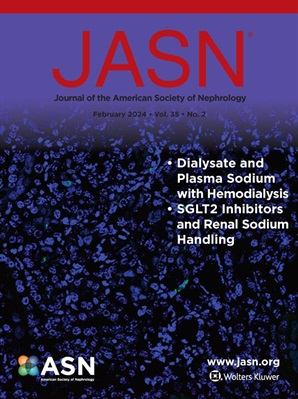FcγRIIB通过IgG在IgA肾病中的细胞特异性调控作用。
IF 9.4
1区 医学
Q1 UROLOGY & NEPHROLOGY
引用次数: 0
摘要
背景:肾小球肾炎是肾小球肾炎最常见的形式,也是肾衰竭的主要原因。大量证据证实了IgA肾病患者肾活检标本中IgA和IgG的沉积,以及单核白细胞的浸润。在此之前,我们在B细胞缺陷小鼠中建立了一个实验性的IgA肾病模型,暗示了Fcγ受体(Fcγ rs)之间的相互作用在IgA肾病的发病机制中。一般认为,fc - γ riib在体液反应中起调节作用;我们提出FcγRIIB可能根据细胞类型特异性发挥不同的肾保护作用,从而影响IgA肾病的进展和严重程度。方法采用IgA肾病小鼠模型和三种不同类型的FcγRIIB缺陷小鼠,包括CEBP/α Cre(髓细胞)、CD11c Cre(树突状细胞)和CD19 Cre (B细胞),以及几种特异性细胞模型。结果在本研究中,我们观察到FcγRIIB基因敲除小鼠引起的IgA肾病的蛋白尿、肾功能损害和肾损伤的大量增加。我们证明巨噬细胞和树突状细胞特异性FcγRIIB缺乏增强NLRP3炎性体的激活,加速IgA肾病的发展和严重程度,而在B细胞特异性FcγRIIB缺乏的小鼠中没有观察到这种影响。此外,炎性小体的激活是由依赖TLR4/MyD88信号的IgA免疫复合物诱导的,可能与Dectin-2之间的串扰有关。结论:在IgA肾病小鼠模型中,巨噬细胞和树突状细胞中FcγRIIB缺乏可导致蛋白尿增加、肾功能障碍和肾损伤。FcγRIIB缺乏以TLR4/ myd88依赖的方式通过IgA免疫复合物增强NLRP3炎性体的激活。本文章由计算机程序翻译,如有差异,请以英文原文为准。
Differential Cell-Specific, Regulatory Roles of FcγRIIB through IgG in IgA Nephropathy.
BACKGROUND
IgA nephropathy is the most common form of glomerulonephritis and a leading cause of kidney failure. Ample evidence confirms the deposition of IgA and IgG, as well as the infiltration of mononuclear leukocytes in kidney biopsy specimens from IgA nephropathy patients. Previously, we established an experimental IgA nephropathy model in B cell-deficient mice, implicating interactions between Fcγ receptors (FcγRs) in the pathogenesis of IgA nephropathy. It is generally accepted that FcγRIIB plays a regulatory role in humoral responses; we proposed that FcγRIIB might exert differential kidney-protective effects depending on cell-type specificity, thereby influencing the progression and severity of IgA nephropathy.
METHODS
Utilizing a mouse model of IgA nephropathy and three different cell types of FcγRIIB-deficient mice, including CEBP/α Cre (myeloid cells), CD11c Cre (dendritic cells) and CD19 Cre (B cells) in floxed FcγRIIB mice, as well as several specific cell models.
RESULTS
In the present study, we observed a large increase in albuminuria, kidney function impairment, and kidney injury in FcγRIIB knockout mice with induced IgA nephropathy. We demonstrated that macrophage- and dendritic cell-specific FcγRIIB deficiency enhanced the activation of NLRP3 inflammasome and accelerated the development and severity of IgA nephropathy, whereas this effect was not observed in mice with B cell-specific FcγRIIB deficiency. Moreover, activation of the inflammasome was induced by IgA immune complexes dependent on TLR4/MyD88 signaling, potentially associated with crosstalk between Dectin-2.
CONCLUSIONS
We found that FcγRIIB deficiency in macrophages and dendritic cells led to increased albuminuria, kidney dysfunction, and kidney injury in a mouse model of IgA nephropathy. FcγRIIB deficiency enhanced activation of NLRP3 inflammasome through IgA immune complexes in a TLR4/MyD88-dependent manner.
求助全文
通过发布文献求助,成功后即可免费获取论文全文。
去求助
来源期刊
CiteScore
22.40
自引率
2.90%
发文量
492
审稿时长
3-8 weeks
期刊介绍:
The Journal of the American Society of Nephrology (JASN) stands as the preeminent kidney journal globally, offering an exceptional synthesis of cutting-edge basic research, clinical epidemiology, meta-analysis, and relevant editorial content. Representing a comprehensive resource, JASN encompasses clinical research, editorials distilling key findings, perspectives, and timely reviews.
Editorials are skillfully crafted to elucidate the essential insights of the parent article, while JASN actively encourages the submission of Letters to the Editor discussing recently published articles. The reviews featured in JASN are consistently erudite and comprehensive, providing thorough coverage of respective fields. Since its inception in July 1990, JASN has been a monthly publication.
JASN publishes original research reports and editorial content across a spectrum of basic and clinical science relevant to the broad discipline of nephrology. Topics covered include renal cell biology, developmental biology of the kidney, genetics of kidney disease, cell and transport physiology, hemodynamics and vascular regulation, mechanisms of blood pressure regulation, renal immunology, kidney pathology, pathophysiology of kidney diseases, nephrolithiasis, clinical nephrology (including dialysis and transplantation), and hypertension. Furthermore, articles addressing healthcare policy and care delivery issues relevant to nephrology are warmly welcomed.

 求助内容:
求助内容: 应助结果提醒方式:
应助结果提醒方式:


